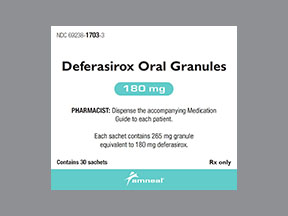
Deferasirox Granules Coupons & Savings Card – Discount Prices from $23.90
Deferasirox is prescribed to manage excessive iron levels in individuals who undergo frequent blood transfusions or those with certain blood disorders like non-transfusion-dependent thalassemia. The medication operates by binding to excess iron, facilitating its elimination from the body through stool. As an iron-chelating agent, Deferasirox plays a vital role in preventing complications associated with iron overload, such as heart failure, liver disease, and diabetes, by reducing iron accumulation in the body.
Our coupons are free to use. Before paying, show the pharmacist your Deferasirox Granules savings card to get your free discount. Use our filters below to edit the prescription box to match your needs. The Deferasirox Granules prices will update based on your prescription needs. Above our Deferasirox Granules coupons, you can change your location to see pharmacy prices and costs in other areas. We're here to help you buy Deferasirox Granules at the lowest price with our prescription discount card.
My prescription
Edit
180MG, Deferasirox (1 Packet)
Select pharmacy

CVS
$95.30
COUPON PRICE
Albertsons
$23.90
COUPON PRICE
Walgreens
$24.36
COUPON PRICE
Walmart
$67.90
COUPON PRICEDeferasirox Granules savings card
Show this card to your pharmacist
Albertsons
$23.90
BIN
ID
PCN
GRP
019876
LH25523574
CHIPPO
LHX
Powered by
Deferasirox is prescribed to manage excessive iron levels in individuals who undergo frequent blood transfusions or those with certain blood disorders like non-transfusion-dependent thalassemia. The medication operates by binding to excess iron, facilitating its elimination from the body through stool. As an iron-chelating agent, Deferasirox plays a vital role in preventing complications associated with iron overload, such as heart failure, liver disease, and diabetes, by reducing iron accumulation in the body.
Our coupons are free to use. Before paying, show the pharmacist your Deferasirox Granules savings card to get your free discount. Use our filters below to edit the prescription box to match your needs. The Deferasirox Granules prices will update based on your prescription needs. Above our Deferasirox Granules coupons, you can change your location to see pharmacy prices and costs in other areas. We're here to help you buy Deferasirox Granules at the lowest price with our prescription discount card.
More prescriptions for iron overload
coupons from$16.40Save 88%
coupons from$129.30Save 90%
coupons from$91.10Save 35%
coupons from$91.10Save 35%
coupons from$1514.23Save 82%
coupons from$1514.23Save 82%
More prescriptions for iron overload
Deferoxamine Save 88%coupons from $16.40
Exjade Save 90%coupons from $129.30
Deferasirox Granules Save 35%coupons from $91.10
Jadenu Save 35%coupons from $91.10
Deferiprone Save 82%coupons from $1514.23
Ferriprox Save 82%coupons from $1514.23
Deferasirox Granules dosage forms
Use our Deferasirox Granules 90MG coupon with prices from $17.50 for 1 Packet. You can also use our Deferasirox Granules 90MG coupon with prices from $307.48 for 30 Packets. We have a Deferasirox Granules 180MG coupon with prices from $24.74 for 1 Packet. You can use our Deferasirox Granules 180MG coupon with prices from $524.61 for 30 Packets.
Dosage Quantity Price from Per unit 90MG 1 Packet $17.50 $17.50 90MG 30 Packets $307.48 $10.25 180MG 1 Packet $24.74 $24.74 180MG 30 Packets $524.61 $17.49 360MG 1 Packet $33.12 $33.12 360MG 30 Packets $732.60 $24.42
| Dosage | Quantity | Price from | Per unit |
|---|---|---|---|
| 90MG | 1 Packet | $17.50 | $17.50 |
| 90MG | 30 Packets | $307.48 | $10.25 |
| 180MG | 1 Packet | $24.74 | $24.74 |
| 180MG | 30 Packets | $524.61 | $17.49 |
| 360MG | 1 Packet | $33.12 | $33.12 |
| 360MG | 30 Packets | $732.60 | $24.42 |
